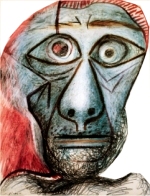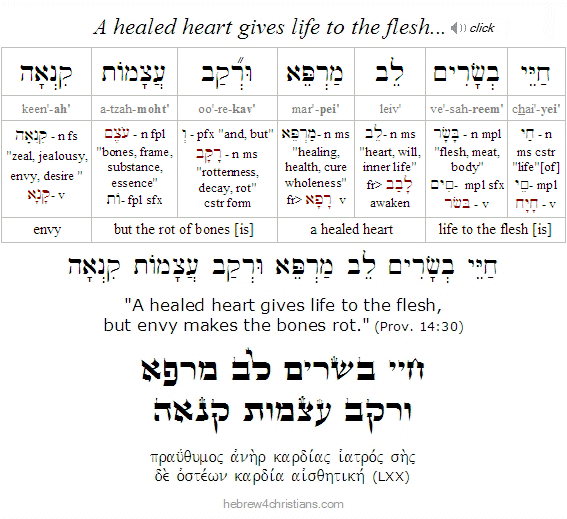|
Our Torah portion this week (Parashat Korach) begins with the words, "And Korach took..." וַיִּקַּח קרַח / (Num. 16:1). The sages note that this verse does not say exactly what it was that Korach took. The Hebrew simply reads, Va'yikach Korach... "And Korach [the son of Yizhar, the son of Kehat, the son of Levi] took..." Different commentators offer different explanations for the Hebrew grammar of this verse. For instance, Rashi states that Korach took himself to a "different side"; Ramban says that he took an evil "eytzah" (counsel) into his heart; Ibn Ezra states he took "other people" into his discontent; and Sforno states that he took the 250 princes of Israel to confront Moses. The Targum Jerusalem and the Onkelos both read, "And Korach took counsel and made division..." As the story of Korach's rebellion unfolds, however, it becomes clear that Korach primarily "took to himself" a sense of entitlement and a lust for power that ultimately lead to disaster.
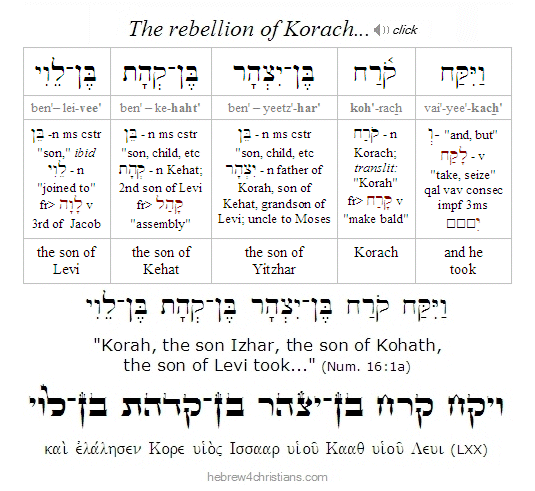 |
Korach was the cousin of Moses and a well-respected Kohathite who was honored to be one of the carriers of the Holy Ark. He was renowned as a wealthy man of influence - a nassi (prince) of the people. However, despite all this privilege, Korach wanted more. Korach rationalized that he should be the head of the Kohathite clan (instead of his cousin Elzaphan), since he was the firstborn of Kohath's second son, whereas Elzaphan was not even a firstborn son. Indeed, because he felt slighted by Moses' choice of Elzaphan, Korach went further and brazenly questioned whether the office of the High Priest should not have been given to him - rather than to Aaron (Num. 16:10). To better understand the tensions running within this most influential family of ancient Israel, consider this genealogy of Levi (from Exodus 6) that shows the relationship between Moses, Aaron and Korach:
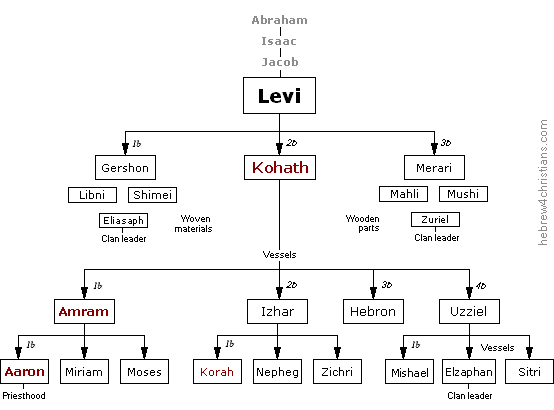 |
Korach believed that as a firstborn son (bechor) of Kohath, he had as much "right" as Moses to obtain honor and power in the newly formed nation of Israel. He therefore questioned Moses' appointment of Aaron as the High Priest of Israel and thought that this office should be given to him instead. After all, Korach had offered sacrifice for the tribe of Levi before the Sin of the Golden Calf, and in relation to their family tree, the choice of the firstborn of Levi ultimately came down to a decision between Aaron, Korach, and Mishael. When Moses appointed Aaron as High Priest and Elzaphan (not Mishael) as the clan leader of the Kohathites, Korach felt slighted. His resentment caused him to seek counsel with Dathan (דָּתָן) and Abiram (אֲבִירָם), two agitators from the tribe of Reuben (Israel's firstborn son) that had a long history of hostility toward Moses.
The Midrash Rabbah states, "Korach argued: My father was one of four brothers; as it says, "And the sons of Kehat: Amram, and Izhar, Hebron, and Uzziel" (Exod. 6:18). As for Amram the firstborn, his son Aaron attained to greatness and Moses to royalty. Who then should rightly take the next office? Is it not the next in line? Now I, being the son of Izhar, should by right be the leader of the Kohathites, yet Moses appointed the son of Uzziel! Shall the son of the youngest of my father's brothers be superior to me? Behold, I shall dispute his decision and put to naught all that has been arranged by him."
According to Jewish tradition, Dathan and Abiram were a constant source of trouble to Moses, right from the beginning. Dathan was said to be the man whom Moses saved from the brutality of the Egyptian taskmaster (Exod. 2:11-14). Instead of expressing gratitude to Moses, however, Dathan reported him to Pharaoh and further disclosed that Moses was a "closet" Hebrew -- not an Egyptian at all (Yalkut Shemoni). This of course caused Moses to flee from Egypt and postponed the great Exodus from Egypt for nearly 50 years...
When the chariots of Pharaoh were closing in on Israel at the Red Sea, we read, "And they said to Moses, 'Are there not enough graves in Egypt that you brought us into the wilderness to die? Why did you bring us out of Egypt?'" (Exod. 14:11). The midrash says that the unnamed "they" in this verse were none other than Dathan and Abiram. Later, when the LORD gave manna to feed the people, Moses instructed not to leave any left over for the following day. "But they did not listen to Moses and the men left over some of it for the next morning and it became infested with worms (Exod. 16:20). Rashi identifies these men as Dathan and Abiram. Likewise, when the spies returned with their evil report about the Promised Land, we read, "And a man said to his fellow, 'Let us appoint a leader and we will return to Egypt" (Num. 14:4). This "man and his fellow" were also said to be Dathan and Abiram (Shemot Rabbah).
Indeed, Dathan and Abiram's staunch opposition to Moses was long standing, and Korach plied on their sentiments. We note the great humility of Moses, then, when he reached out to these men after they joined the forces of rebellious Korach. First he "sent for" them, though he was rebuffed (Num. 16:12); then Moses delayed God's judgment, giving them opportunity to repent (Num. 16:5,16); and finally Moses "rose up and went to them" to make a personal appeal (Num. 16:25). Notice that Dathan and Abiram repudiated Moses by saying, "Is it a small thing that you have brought us up out of a land flowing with milk and honey, to kill us in the wilderness, that you must also make yourself a prince over us?" (Num. 16:13; cp. Exod. 2:14). Note that for these men, Egypt was a "land flowing with milk and honey" and Moses took them out of there to kill them in the desert! For the wicked, nothing seems as fine as the debauchery and fleshpots of Egypt...
The Chofetz Chaim notes that Moses' actions demonstrate that every person is obligated to avoid disputes, even if he might otherwise be justified. Everything should be done l'shem shamayim - "for the sake of heaven," and anger is often a symptom that other motives are involved in a dispute. As Abraham Heschel said, "In a controversy, the instant we feel anger, we have already ceased striving for truth and have begun striving for ourselves." Likewise, Maimonides likened those who become angry as "idol worshippers," since the exaltation of the will is made absolute (Hilchot Deot). This concept was enshrined in the Mishnah: "Any machloket (argument) which is for the sake of Heaven (l'shamayim) will stand; and any machloket which is not for the sake of Heaven will not stand" (Pirkei Avot 5:20). For the sages, a dispute between the House of Shammai and the House of Hillel was for the sake of heaven, whereas that of Korach and his co-conspirators was clearly not. The difference had to do with the aim or end of the dispute ("for the sake of"). In the case of the various Shammai/Hillel disputes, the goal was to discern the will of God, and when a dispute was settled, everyone agreed to follow the ascertained course with civility. In the case of Korach and his followers, however, each person contended for his own honor and power.
The claim that the true "land of milk and honey" was in Egypt, rather than in the land promised to the patriarchs of Israel, radically questioned Moses' entire mission and ministry. Korach's alliance with the Dathan and Abiram essentially constituted a reversion to the life of Egypt, where the role of the firstborn son was regarded as the chieftain of the clan. Moses' Torah did away with the old order of primogeniture by making the Levites as God's chosen ministers. Korach called for a return to the "old order" where he and his co-conspirators enjoyed a measure of worldly prominence. His rallying cry of "power to the people" was therefore disingenuous and based on duplicity.
Perhaps the inner motive of Korach was one of jealousy or envy. Despite all his privileges, Korach refused to be at peace with his cousins' blessings. His envy led him to be a "taker" rather than a giver (i.e., "Korach took..."). And like most other instigators that lust for power over others, Korach (influenced by Dathan and Abiram) made his appeal to the crowd. He waged a campaign that spread like an infection throughout the people of Israel. By winning the favor of the crowd he acquired a false sense of strength, of rightness, and of authority... Within the clamor of the crowd, Korach disguised his envy and ambition by claiming that he was motivated by a sense of "democracy" and equal rights for all... He then made his pitch to the other princes of Israel, pretending to be a "man for the people" who only wanted "power to the people" (Bamidbar Rabbah 18). After securing the political alliance of 250 men of influence (who undoubtedly hedged their bets in the political showdown to come), Korach was emboldened to confront Moses with these words: "All the community are holy, all of them, and the LORD is in their midst. Why then do you raise yourselves above the LORD's congregation?" (Num. 16:3).
I mentioned recently that the outworking of humanity's spiritual history is essentially a conflict between good and evil. Yeshua referred to it (among other things) as a conflict between the Kingdom of God (מַלְכוּת אֱלהִים) and the kingdom of Satan (John 8:34-6). The Apostles likewise spoke of "children of darkness" and "children of light" (Eph. 5:8; Col. 1:13, 1 Thess. 5:5, etc.). Politically speaking, St. Augustine described the cosmic conflict as one between the "City of Man" and the "City of God." Worldly politics nearly always involves some form of violence against those who belong to God (Matt. 11:12). Korach "took" in order to gain, whereas Moses gave in order serve. Moses and Korach, though closely related by family genealogy, reveal radical differences in their spiritual identities. Discontent always leads to the "graves of craving," as the story of Korach's rebellion further attests.
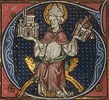
The Malbim writes (HaTorah v'HaMitzvah) that each man in Korach's assembly opposed each other. Korach wanted the role of the High Priest; Dathan and Abiram rejected the role of the Levites and wanted the Sanctuary to belong to the tribe of Reuben; and the 250 princes wanted the priesthood to belong to the nobility of Israel (in the name of "the people," of course). The sages therefore called this the "dispute of Korach and all his assembly" since each person only had himself in mind, opposing others in the rebellion. Hence we see Moses appealing to God not to hear his adversaries' prayers (Num. 16:15). There is hidden consolation in all this: Satan's hierarchy is one marked by infighting and confusion. Political power is exercised ultimately by threat of force or murder. We can rightfully pray that God will bring to confusion and disunity the schemes of the wicked (Psalm 2:2-5; 35:4, 70:3; 109:29; etc.). "No machloket that is not for the sake of Heaven will stand." No weapon formed against God's true servants will prosper, and no curse directed against them will prevail (Prov. 26:2).
Korach's reactionary propaganda campaign nearly succeeded, as the people were ready to stone Moses (Bamidbar Rabbah), though in the end, Korach and his army were swallowed into the depths of the earth. After the "showdown of the fire pans," Moses and Aaron were instructed to "separate themselves" from the entire congregation of Israel because God was going to destroy them in an instant. "But they fell on their faces and said, "O God, the God of the spirits of all flesh (אֵל אֱלהֵי הָרוּחת לְכָל־בָּשָׂר), shall one man sin, and will you be angry with all the congregation?" (Num. 16:22). The LORD then told them to instruct all the people to get away from the tents of Korach, Dathan, and Abiram. Moses then went before the tents of his rivals Dathan and Abiram and affirmed that the LORD has chosen him to lead Israel. He then pronounced the LORD's judgment and the earth swallowed them up alive.
According to Jewish legend, the "mouth of the pit" that swallowed Korach and his followers was one of the ten things God made just before the first Shabbat of creation (Pirke Avot 5:9). (The other nine were the Well of Miriam; the mouth of Balaam's donkey; the rainbow; the manna; the staff of Aaron; the shamir worm (used to inscribe the names of the tribes on the gemstones of the High Priest's breastplate); the Hebrew script; the inscription on the Tablets; and the Tablets themselves.)
The sages state that the rebels were punished by the "mouth of the earth" because they sinned with their mouths, speaking lashon hara (לָשׁוֹן הָרָה) by disparaging Moses and Aaron. And just as Korach sought to "eat up the world" for his own purposes, so the earth itself swallowed up his carnal illusions. This is called middah keneged middah justice - "measure for measure" (John 4:37; Gal. 6:7). Because Korach and his followers wanted to elevate themselves, they were brought down into the depths of the earth (Prov. 16:18; Luke 18:14). This is an image of Hell (שְׁאוֹל) in the Torah, where the conspirators are thrown alive into a pit. But note that this principle works the other way around, too. Though the "fire from LORD" went forth and consumed the 250 men who offered incense, the fire that kindled the incense of Aaron's firepot was used to be the means by which the LORD stopped the plague. This was meant to show that it was not the incense itself that killed, but the sin of arrogantly offering "strange fire" before the Sanctuary. Fire offered falsely will be answered by the fire of God's judgment. The world offers its version of God's real "milk and honey," and Korach and the other rebels recalled its savor. Clinging to past pleasures is a symptom of bondage, similar to eating the "food of the White Witch" that poisoned Edmund in C.S. Lewis' story the Lion, Witch, and the Wardrobe.
The name Korach (קרַח) means "bald" (קֵרֵח) or "ice" (קֶרַח), both of which imply a lack of fertility or growth. Just as hair does not grow on a bald head or vegetation from ice, so Korach represents self-centeredness and lack of growth.... Some of the sages note that his name suggests the "taking" (קח) of evil (רע), that is, the madness governed by an entirely self-centered existence.
Korach is surely a mysterious madman, similar in some ways to the enigmatic false prophet Balaam who sought "high places" to curse Israel... How else could a prince of the most distinguished family of Israel rebel against against someone of the stature of Moses? Weren't all the Israelites direct eyewitnesses of the miracles of the Exodus? Korach himself surely knew of Moses' encounters with Pharaoh and the miracles of the ten plagues. He saw the waters turn to blood; he trembled as he saw the thunder and hail; he marveled over the three days of darkness that came upon Egypt, etc. And he smeared the blood of the lamb on the lintel and witnessed the death of the firstborn of Egypt. Indeed, Korach willingly followed Moses as the Israelites finally left Egypt after hundreds of years of cruel bondage... He beheld the Pillar of Fire and watched as Moses split the sea with his staff; he ate from the heavenly manna and drank from the water that sprang from the rock. Later he witnessed Moses ascend into the midst of the cloud at Sinai to receive the Torah. How could he have seriously doubted that Moses was directly commissioned by God to be Israel's leader?
Korach's madness was centered on his attitude of entitlement, or "taking." This is implied in the first verse of the Torah portion and is hinted at by his name. His envy literally blinded him to the evidence he had seen with his own eyes. Korach therefore constitutes an object lesson for us and demonstrates that "seeing isn't believing." We need more than "signs and wonders" to move our hearts to love and obey the LORD. There are open and hidden riches. There is a pearl of great price, a treasure "hidden in a field." These riches are regarded as "fool's gold" to those who love this world and trust only in the realm of the phenomenal, but to those who trust in the LORD, they represent all that the heart needs.
We must first settle the issue of God's personal love for us, since that determines everything else. To accept God's love changes everything we see and experience. We believe in order to see God's love and kindness to us -- not the other way around. Korach and his followers remind us that getting this wrong leads to madness and spiritual death.
May you wholeheartedly receive the love of God for your soul this day... Amen.
Hebrew Lesson
Proverbs 14:30 reading (click):
|


